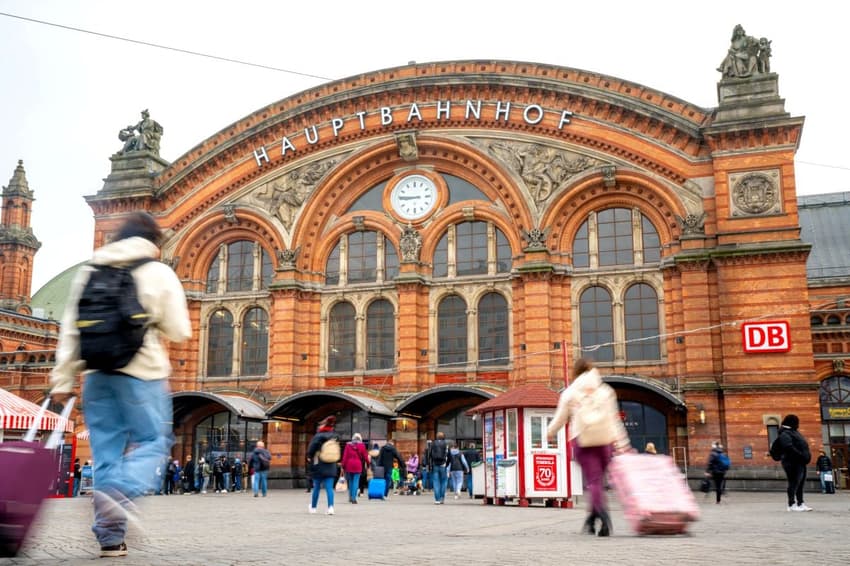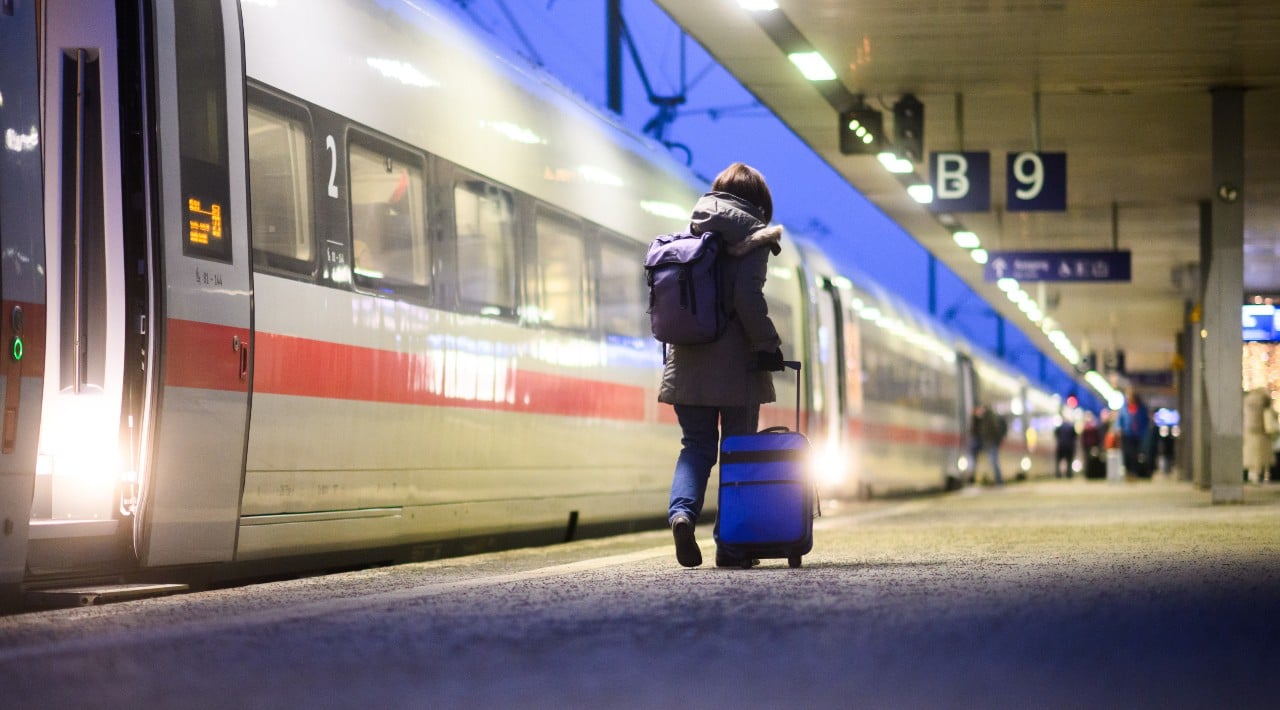Easter travel: Are German train strikes set to end?

After a fierce dispute resulting six walkouts, the GDL train drivers' union and Deutsche Bahn are negotiating again. This time both sides are signalling that an agreement could be reached this week.
The news is cause for relief for rail passengers across Germany: the train drivers' union (GDL) and German rail operator Deutsche Bahn are talking to each other again. And not only that: according to both sides, an agreement is imminent this week.
Until then, the GDL union boss, Claus Weselsky, wants to refrain from further strikes. After six walkouts, the labour dispute, which has been smouldering for months, could be pacified before Easter.
"Both parties are confident that they will be able to announce a result next week," DB and the union said in a joint statement on Saturday.
"Until then, the GDL will refrain from further strikes."
Strike-free Easter period is possible
The first glimmer of hope is seen in how collective bargaining negotiations took place this time. Instead of publicly laying out conditions before the talks, this time even the resumption of negotiations remained a secret.
"In the smallest circle and behind closed doors" negotiations are taking place, the statement said, although the status of the dispute was not disclosed.
But DB and the union did go as far as saying: "An agreement was reached on many issues."
In some states the Easter holidays begin on Monday. Against this background, Federal Transport Minister Volker Wissing had previously called on trade unions in the aviation and rail sectors to observe an Easter truce.
"It is important that a solution is found now," said the FDP politician on Saturday at a Rhineland-Palatinate state party conference.
READ ALSO: 'We need an Easter truce': How strikes in Germany have sparked a bitter row
There was also encouragement from the Pro-Bahn passenger association. "The foreseeable agreement is in the interest of the passengers," chairman Detlef Neuß told the German Press Agency (DPA). He added that further strikes would be met with less and less understanding from the public.
"Passengers already have enough problems with the normal delays," Neuß said.

A woman walks along an icy platform at Hanover Central Station during a GDL strike. Photo: picture alliance/dpa | Julian Stratenschulte
The union and Deutsche Bahn last sat together for negotiations for several weeks in February to find a solution to the wage dispute. Former Interior Minister Thomas de Maizière and Schleswig-Holstein's State Premier Daniel Günther (both CDU) mediated in this phase.
But terms that could be accepted by both sides failed to be reached.
Working time as a bone of contention
The sticking point of the negotiations is a demand by the GDL to reduce the working hours of shift workers from 38 to 35 hours per week, without a cut to workers' pay.
Deutsche Bahn had previously shown itself willing to reduce working hours in two steps to 36 hours by 2028 without any financial losses. GDL boss Weselsky, however, refused.
The union has already signed collective agreements with more than two dozen other railway companies that stipulate the 35-hour week. However, these are subject to the proviso that the state-owned railway company also agrees to such a deal. Otherwise, the existing contracts would be adjusted accordingly. Weselsky wants to prevent this.
While the specific terms of ongoing negotiations are not being discussed, the fact that GDL has signalled a coming agreement seems to suggest that DB may be willing to give in to workers' demands for a 35 hour work week.
The GDL has already called for strikes six times in the current wage dispute with Deutsche Bahn. Most recently, the union moved to a so-called wave strike, where action is announced without 48 hours notice.
Last week's strike was announced with very little notice, catching DB and rail passengers unprepared.
In response to the growing regularity of strikes, the FDP have once again called for a reform of the right to strike.
Especially in the case of critical infrastructure, it is important "that proportionality is maintained and that excessive greed for strikes, as we have experienced, is prevented in the future," said Secretary General Bijan Djir-Sarai to the "Bild am Sonntag".
The FDP proposes the adoption of tools for reducing strikes, such as mandatory arbitration, clear strike deadlines and the possibility of replacing negotiators.
However, Chancellor Olaf Scholz, of the Social Democrats, recently rejected these demands.
What about other transport strikes?
The expected truce between GDL and DB is good news for train passengers who plan to travel over Easter, but a degree of caution needs to be maintained as the situation can change rapidly.
There is also an ongoing threat of strikes affecting other transport in Germany, which could hit during Easter holidays.
For instance, trade union Verdi is currently in the midst of negotiations with public transport unions throughout Germany, with the exception of Bavaria.
There have also been several strikes recently affecting air travel - so that is something that travellers will have to look out for.
Comments
See Also
The news is cause for relief for rail passengers across Germany: the train drivers' union (GDL) and German rail operator Deutsche Bahn are talking to each other again. And not only that: according to both sides, an agreement is imminent this week.
Until then, the GDL union boss, Claus Weselsky, wants to refrain from further strikes. After six walkouts, the labour dispute, which has been smouldering for months, could be pacified before Easter.
"Both parties are confident that they will be able to announce a result next week," DB and the union said in a joint statement on Saturday.
"Until then, the GDL will refrain from further strikes."
Strike-free Easter period is possible
The first glimmer of hope is seen in how collective bargaining negotiations took place this time. Instead of publicly laying out conditions before the talks, this time even the resumption of negotiations remained a secret.
"In the smallest circle and behind closed doors" negotiations are taking place, the statement said, although the status of the dispute was not disclosed.
But DB and the union did go as far as saying: "An agreement was reached on many issues."
In some states the Easter holidays begin on Monday. Against this background, Federal Transport Minister Volker Wissing had previously called on trade unions in the aviation and rail sectors to observe an Easter truce.
"It is important that a solution is found now," said the FDP politician on Saturday at a Rhineland-Palatinate state party conference.
READ ALSO: 'We need an Easter truce': How strikes in Germany have sparked a bitter row
There was also encouragement from the Pro-Bahn passenger association. "The foreseeable agreement is in the interest of the passengers," chairman Detlef Neuß told the German Press Agency (DPA). He added that further strikes would be met with less and less understanding from the public.
"Passengers already have enough problems with the normal delays," Neuß said.

The union and Deutsche Bahn last sat together for negotiations for several weeks in February to find a solution to the wage dispute. Former Interior Minister Thomas de Maizière and Schleswig-Holstein's State Premier Daniel Günther (both CDU) mediated in this phase.
But terms that could be accepted by both sides failed to be reached.
Working time as a bone of contention
The sticking point of the negotiations is a demand by the GDL to reduce the working hours of shift workers from 38 to 35 hours per week, without a cut to workers' pay.
Deutsche Bahn had previously shown itself willing to reduce working hours in two steps to 36 hours by 2028 without any financial losses. GDL boss Weselsky, however, refused.
The union has already signed collective agreements with more than two dozen other railway companies that stipulate the 35-hour week. However, these are subject to the proviso that the state-owned railway company also agrees to such a deal. Otherwise, the existing contracts would be adjusted accordingly. Weselsky wants to prevent this.
While the specific terms of ongoing negotiations are not being discussed, the fact that GDL has signalled a coming agreement seems to suggest that DB may be willing to give in to workers' demands for a 35 hour work week.
The GDL has already called for strikes six times in the current wage dispute with Deutsche Bahn. Most recently, the union moved to a so-called wave strike, where action is announced without 48 hours notice.
Last week's strike was announced with very little notice, catching DB and rail passengers unprepared.
In response to the growing regularity of strikes, the FDP have once again called for a reform of the right to strike.
Especially in the case of critical infrastructure, it is important "that proportionality is maintained and that excessive greed for strikes, as we have experienced, is prevented in the future," said Secretary General Bijan Djir-Sarai to the "Bild am Sonntag".
The FDP proposes the adoption of tools for reducing strikes, such as mandatory arbitration, clear strike deadlines and the possibility of replacing negotiators.
However, Chancellor Olaf Scholz, of the Social Democrats, recently rejected these demands.
What about other transport strikes?
The expected truce between GDL and DB is good news for train passengers who plan to travel over Easter, but a degree of caution needs to be maintained as the situation can change rapidly.
There is also an ongoing threat of strikes affecting other transport in Germany, which could hit during Easter holidays.
For instance, trade union Verdi is currently in the midst of negotiations with public transport unions throughout Germany, with the exception of Bavaria.
There have also been several strikes recently affecting air travel - so that is something that travellers will have to look out for.
Join the conversation in our comments section below. Share your own views and experience and if you have a question or suggestion for our journalists then email us at [email protected].
Please keep comments civil, constructive and on topic – and make sure to read our terms of use before getting involved.
Please log in here to leave a comment.